I thought about posting my Top 100 Games of the '00s list here, but considering the dedicated group of gamers at Bitmob, what's the point of recommending the same stuff that everyone has already played? The thing I love about lists isn't cross-referencing them with my own taste, but hopefully finding new gems that slipped under my radar. The games I present here have all sold poorly, received minimal coverage, and failed to accumulate a fan base over the years. These are games you not only haven't heard praised, but maybe haven't heard of at all.
It can be a pain to seek some of these out, especially the PC titles, but it's well worth the effort, especially if you consider yourself a gaming connoisseur. Enjoy, and please share some of your favorite, little-known games in the comments!
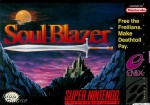 Soul Blazer (SNES, 1992)
Soul Blazer (SNES, 1992)
Caught between the superior Actraiser and Illusions of Gaia both chronologically and gameplay wise, Soul Blazer was another overlooked classic of the '90s from developer Quintet. It was another Zelda-esque adventure, but told with a more dynamic narrative and responsive world. While Zelda's dungeons mostly stayed the same, each area of Soul Blazer was incredibly different and inventive. From fighting on an island to fighting on a giant game board, Soul Blazer made the same old grind feel new. Each enemy nest you defeated revived a villager, which kept the combat rewarding and worked into a strangely esoteric narrative.
Plays like: The Legend of Zelda: A Link to the Past, Actraiser, Alundra.
Seekability: Absolutely. The mood and atmosphere of the game was haunting, and the controls spot-on. It's a very unique game that aged wonderfully, just like the rest of Quintet's catalog.
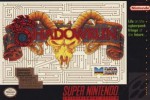
Shadowrun (SNES, 1993)
Shadowrun was an early role-playing game favorite with an awesome cyberpunk setting and mesmerizing soundtrack. While the point-and-click controls were an odd choice for a console game that relied on quick responses in combat, Shadowrun was full of great ideas packed into one of the most original worlds of the 16-bit era. While the Sega and Xbox 360 games bearing the same name aren't bad, don't let them stop you from playing this rare, Western-made classic of the SNES era.
Plays like: A JRPG meets Syndicate meets a LucasArts adventure game.
Seekability: The game doesn't really fit well with the usual SNES nostalgia due to its unconventional aesthetic, but it's worth seeking out if you like cyberpunk and/or more simpler adventure/RPGs. Film noir fans will also find much to love.
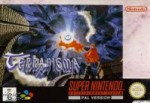 Terranigma (SNES, 1995)
Terranigma (SNES, 1995)
While Quintet's previous titles feel tied to their system and year, Terranigma's grandiose adventure begs for a modern reimagining. The game's ending credits sequence pulled the heart strings — I'll admit I got a little something in my eye, not because of the ending, but because of just how damn amazing Quintet was at that exact moment. I have never played a game that merged a fantasy world so well with our own history, and did it not as a gimmick, but as a way to tell a very impactful environmental message. It's a rare game that doesn't pat the player on the back, but instead conveys a message about how terrible the world is, and maybe even offers a way to make it a bit better.
Plays like: Secret of Mana, Illusion of Gaia, The Legend of Zelda: A Link to the Past.
Seekability: Yes. You've never played a 16-bit game with this much depth, detail, and heart. It feels a little too long-winded to put up there with Chrono Trigger and other Square classics, but it's at the top of the second tier. The mood, soundtrack, and story will keep you as involved as any modern game.
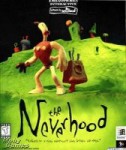 The Neverhood (PC, 1996)
The Neverhood (PC, 1996)
Sierra's use of claymation in their classic adventure series and Clay Fighters was impressive, but The Neverhood truly defined the claymation-via-video-game movement of the '90s. Wait, who am I kidding? No one remembers The Neverhood, but they should, because that distinctive animation plus a fantastic adventure game turned a would-be-dated 32-bit environment into a timeless world made of clay. The Neverhood had a personal touch of charm and humor that is often missing in games, even today. It didn't have the brainiest puzzles, most captivating story, or prestige of the Sierra or Lucasarts names — what it had was a quality and look that is as distinct now as it was in '96.
Plays like: Myst, The Secret of Monkey Island.
Seekability: If you're an adventure genre fan, this is a must play. If you appreciate unorthodox art styles in games then check it out; otherwise it's not worth the bother of setting up on a modern machine.
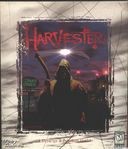 Harvester (PC, 1996)
Harvester (PC, 1996)
If it were possible — if I could simply give you a link and you could play this game on a website — I would insist that everyone I know sit down and fire up this masterpiece right now. Harvester's madness has no equal in film, books, or any medium, and it's a damn shame. The game itself was severely flawed, but it had one of the most supremely fucked stories that I've ever experienced. The dated synths and morphed humans of the FMV graphics only added to the surreal charm. This is a one-of-a-kind experience that will fuck with your head for life. It's one of the greatest video games as far as I'm concerned.
Harvester came from an earlier age, before Hollywood , parents, and media paid attention to games. You never knew what to expect: Don't give the paper boy his money and he would eventually pull a gun on you; a fever dream narrative would lead to a discussion of the meaning of life, only to make fun of you for playing and the game for existing. It broke every rule of game storytelling, and no one was there in '96 to take notes.Â
Plays like: A somewhat non-linear adventure game with weapons.
Seekability: If you have ever contributed to the 'games as Art' argument, you need to stop typing and play this one. It can be a pain to obtain and install, but, if nothing else, take a glimpse at my YouTube playthrough to see the madness you've been missing.
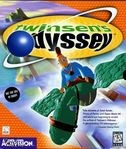
Twinsen's Odyssey/Little Big Adventure 2 (PC, 1997)
For some reason, Twinsen's Odyssey outdid Ocarina of Time a year before that game came out, and didn't sell 1/1,000 of the N64 hit. For a time when games felt so constrained, Odyssey not only made the world seem limitless, but also the imagination that drove it. Every friend that I loaned it to didn't want to give it back, and, even worse, it was nowhere to buy!
Plays like: The Legend of Zelda: Ocarina of Time, any epic action-adventure.
Seekability: It's hard to appreciate now due to badly dated controls and graphics, but if you want to play an epic adventure unlike any other, then it might be worth putting up with its quirks.
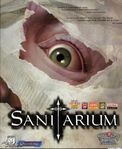 Sanitarium (PC, 1998)
Sanitarium (PC, 1998)
Nothing was quite like Harvester, but Sanitarium came pretty damn close. Another much-overlooked adventure game after the genre's golden age, Sanitarium's mind-bendingly surreal story and brilliantly imagined world compelled players to uncover an intriguing spiritual mystery. The way the game jumped to different realities (or illusions?) made for a unique interactive experience — games are such a ripe medium for exploring themes such as an unreliable narrator and existential questions of identity, it's too bad they don't do so more often.
Plays like: Harvester, Diablo without combat.
Seekability: Go to gog.com, buy Sanitarium, thank me later.
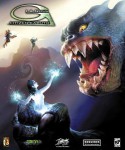
Giants: Citizen Kabuto (PC, PS2, 2000)
Imagine a real-time strategy game with three different, distinct factions (a space race with jet packs, an ethereal sea creature, and a giant monster), each with particular advantages and resource gathering. Battles played out in third-person shooter style, while base management was more like a traditional RTS. That was Giants: Citizen Kabuto, and it was nearly flawless. Whether it was the name or its hard-to-explain gameplay (and people wonder why Brutal Legend kept quiet on its true RTS nature), Giants bombed on both the PC and its PS2 port. The world and the sense of humor that kept the single-player entertaining (see here) made this a game that still holds up today. I wish more games took chances like this, although it's hard to blame publishers considering the result.
Plays like: Sacrifice, Brutal Legend.
Seekability: It's more of a novelty at this point, but if you feel a hankering for an interesting, albeit dated, strategy game then Giants is worth looking for in the bargain bin.
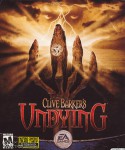 Clive Barker's Undying (PC, 2001)
Clive Barker's Undying (PC, 2001)
While it didn't top System Shock 2 in general creepiness, Clive Barker's Undying was a loving ode to Lovecraftian storytelling. The game's set-up was like a classic horror film — an undisclosed millionaire tasked you with investigating some paranormal activity, as millionaires do. You wandered around the large halls of the client's mansion until all hell broke loose. This game had some insanely scary moments and a genuinely interesting story, and also introduced the "left hand magic, right hand gun" mechanic that would be copied in Bioshock. It's a much-forgotten classic of 2001, and proof you don't need to be a survival horror game to be scary.
Plays like: Bioshock, System Shock, Half-Life
Seekability: I often find the game at used bookstores, so it's not all that rare. The gameplay isn't as deep as Bioshock, but you'll still have fun with it if you can forgive its linear nature, and level design limited by the Unreal engine.
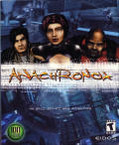 Anachronox (PC, 2001)
Anachronox (PC, 2001)
Much like GoldenEye 007 was only unique because it was on a console instead of PC, Anachronox was unique because it was on PC instead of a console. Anachronox was the result of Western developers well-versed in the shooter genre wanting to pay homage to Japanese RPGs. It was an ugly, flawed game, a far cry from the elegant design of Square's classics, but with so much charm and promise. It was one of those games that you sincerely wished was better, because what it did it did so damn well. With Chrono Trigger and Final Fantasy as the groundwork, Anachronox built a mature and cyberpunk world that was largely preferable to the cliches that plagued console JRPGs since the SNES era. It wasn't the most fun JRPG (errr…WRPG?), but the story, presentation, and script were shining achievements in the genre. Or outside the genre. OK, I'm confused now.
Plays like: Chrono Trigger, Final Fantasy 7.
Seekability: It's easy to find and install on modern systems, but the game has aged pretty badly. You have to be a dedicated JRPG fan to find enjoyment in this one  — it's a slow burn with uneven pacing. If you can put up with it, you'll get a JPRG-style game coupled with a story that feels more in tune with Star Wars and Firefly.
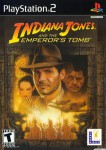 Indiana Jones and the Emperor's Tomb (PS2, 2003)
Indiana Jones and the Emperor's Tomb (PS2, 2003)
I don't know what's more amazing: that it took this long for Indiana Jones to come back, or it took this long to make an awesome Tomb Raider rip-off. And Lara-inspired it may be, but Indiana Jones and the Emperor's Tomb's fighting system, shooting gallery sections, and production values made it more than a glorified paint job. Even without the Indiana name, this was just a great game that was somehow overlooked due to some minor technical flaws. Add on a faithful representation of the Indiana Jones license and you have one of those games that is a must grab from the bargain bin, if you can ever find it there.
Plays like: Tomb Raider.
Seekability: Pretty standard stuff, but if you're a fan of Tomb Raider 1 & 2 or really love Indiana Jones, it's well worth seeking out.
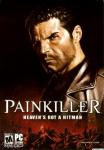 Painkiller (PC, 2004)
Painkiller (PC, 2004)
Ever since making Quake 2, id Software has slowed down gameplay and added new mechanics rather than recapture the chaos of shooting 20 incoming enemies with your five remaining rockets. Luckily, developer People Can Fly remembered what made those classic id games great, and tried their hand at a new one. To me, Painkiller completed a FPS trinity started by Doom and Quake. Imagine if Quake met Serious Sam with Doom's atmosphere — and a variety of levels and enemies to ensure that you were never in the same area fighting the same dudes for long. The real selling point was the unlockable tarot card system, which worked as a sort of custom power-up load-out. The game had its flaws, but, overall, this was the game I was hoping Doom 3 would be.
Plays like: Serious Sam, Quake.
Seekability: A must play for any '90s FPS fan. It's mindless, but has enough level variety, player progression, and personality to keep you invested. The perfect game to play while listening to podcasts.
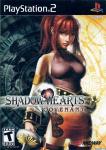 Shadow Hearts: Covenant (PS2, 2004)
Shadow Hearts: Covenant (PS2, 2004)
This is one of my favorite underrated games of all time. Ex-Chrono Cross team members made the Shadow Hearts series, so it's no surprise that this game was so excellent. The first game in the series had its charm but just didn't come together quite right. The environment and battle systems were genius, and Covenant added a good story and adventure to the mix. The story didn't compare to entries in the Final Fantasy series, but the game was enough fun to make up for it. This was one of those rare RPGs that you played just because the battle system was addictive, but with such an awesome cast of characters and world there was a lot to love. The bizarre sense of humor and B-horror movie touches made Covenant a more confident sequel with a unique identity among the JRPG crowd. And you power-up by collecting gay porn magazines. Innovation!
Plays like: Final Fantasy 10, Chrono Cross.
Seekability:Â It's a great JRPG that you can easily find on eBay or Gamefly. It's a hell of a lot better than any JRPG I've played since FF10 (I still need to play Persona 4, however).
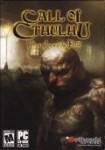 Call of Cthulhu: Dark Corners of the Earth (PC, 2005)
Call of Cthulhu: Dark Corners of the Earth (PC, 2005)
Despite The Adventure Company releasing adventure games every season (with a name like that, what else are they gonna do?), the genre pretty much died back in the late '90s, when LucasArts and Sierra largely abandoned adventure games. It's interesting, then, to see how many first- and third-person action games appropriate elements of the adventure genre. Call of Cthulhu was such a game — it played like a first-person survival-horror adventure. In fact, the first third of the game was a straight-up adventure with some stealth segments. Then it fell apart and turned into a shooter, but it began so strongly and had such a unique atmosphere that it's a must-play for anyone curious.
Plays like: Penumbra: Black Plague, Silent Hill, Condemned
Seekability: Easy to find/download. It lacks polish, but has some great ideas that other games should incorporate as well. My favorite: You can freak out if you stare at any of the game's horror set pieces, and temporarily lose your vision and control.
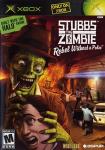 Stubbs the Zombie (PC, 2005)
Stubbs the Zombie (PC, 2005)
Few games out there try to have a sense of humor, and even fewer succeed. Just look at 2009’s most-panned title, Leisure Suit Larry: Box Office Bust. While sales figures suggest that Stubbs the Zombie was another comedic failure, that couldn’t be further from the truth. Stubbs stands among titles like Psychonauts and MDK 2, which displayed a unique brand of humor that complemented a unique brand of gameplay. The ability to start your own zombie army really made Stubbs much more than a reskinned Halo.
Plays like:Â Hell, I really don't know with this one….
Seekability: It's one of the shortest and sweetest games on the original Xbox, and makes for a very memorable couple hours with or without a friend via co-op. It was a good zombie game before we had a slew of them, and still plays like no other.
 Rhythm Tengoku (GBA, 2006)
Rhythm Tengoku (GBA, 2006)
Rhythm games had become a dime a dozen by the halfway point of the '00s. While Gitaroo Man and Space Channel 5 linger in our memory for good reason, many will remain rightfully forgotten. Rhythm Tengoku is in limbo, however, as it was never released outside Japan, but with an emulator and controller you can live the magic. Rhythm Tengoku came from the makers of WarioWare, and had the same childish art style, weird Japanese humor, and variety of simplistic minigames. The game's charm was infectious. America eventually saw the DS release of Rhythm Heaven, but, like the WarioWare franchise, the original did it best.
Plays like: WarioWare, Rhythm Heaven.
Seekability: Like music games? Like crazy shit? Import this game now!
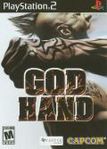 God Hand (PS2, 2006)
God Hand (PS2, 2006)
How can you not love a game that threatened to "dragon kick your ass into the milky way!" and ended with the entire cast of baddies dancing it up at "God Hand Fruits?" God Hand felt like the game Aqua Teen Hunger Force's writers would make if they were obsessed with beat-em-ups and horrible English anime dubs. God Hand was possibly the funniest game ever made, and had a sense of humor that was all its own, which is rare to come by. While I could go on and on about the genius dialog and voice work, the game itself was just as worthy of praise. It managed to recapture old school beat-em-ups in a way that Ninja Gaiden and Devil May Cry couldn't, while still implementing a deep fighting system similar to those games. Between crafting your own combos and choosing what moves to spend money on, the game had possibilities that further separated it from similar titles. Even if the gameplay failed, I'd still want to revisit God Hand's bizarre world and homoerotic cast of characters.
Plays like: MadWorld, Final Fight, Ninja Gaiden.
Seekability: Don't let the ridiculous cover full you. It's 100X more ridiculous than that. It's my pick for funniest game of all time, a must-play for anyone with a sense of humor.
 Mother 3 (GBA, 2006)
Mother 3 (GBA, 2006)
An outsider to the series might glance at Mother 3 and assume it was a quirky RPG for hardcore fans. They wouldn’t be wrong, but Mother 3 was so much more than just a self-aware genre exercise. Thanks to an inspired setting and a real joie de vivre, this was a game you would feel compelled to share with your friends, whether they played games or not. Its minimal design and light-hearted script accentuated the game’s themes of capitalism and loss of cultural identity via industrialization, without ever feeling heavy-handed like so many other JRPGs. It made you feel richer for playing it, not because you gained any achievement points, but because it was a memorable experience and a story you’d think about long after it ended.
Plays like: Earthbound.
Seekability: You've played Earthbound, you've seen Mother 3 at #3 on Destructoid's Best of the 00s list, and you've thought about playing it, but now you're going to stop typing and finally start the damn thing.
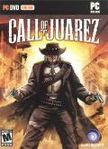 Call of Juarez (PC, 2007)
Call of Juarez (PC, 2007)
Call of Juarez was rough around the edges; between the lacking intro and awkward quick draw controls, there was room for improvement, which the generic shooter sequel side-stepped more than addressed. But the pros strongly outweighed the cons. Even if it was a short adventure, it was much better than most modern westerns that make it to theaters. If you are an Indiana Jones fan, or western fan, or first-person shooter fan, or…hell, this is just a game that any fan of inventive games and strong narrative needs to play and appreciate. Call of Juarez has been an unsung hero in the FPS genre for far too long. It may lay low on Metacritic with a yellow rating, but the term “buried treasure†has never been more appropriate.
Plays like: Call of Duty + Call of Cthluhu.
Seekability: An absolute must-play for its ambition and handful of stunning moments. You just don't see FPS games boldly step out of their genre like this one.
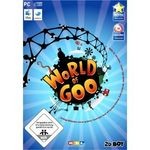 World of Goo (PC, 2008)
World of Goo (PC, 2008)
World of Goo had a strange Tim Burton-in-Candyland feel that was charming and haunting. Without ruining anything, the third game world completely changed the gameplay and setting, and displayed the sort of inventiveness that most big franchises hold back for a sequel. World of Goo might not impress your friends as much as Fallout 3, but I wouldn't doubt that it would pull you in as much or more than the bigger titles of Fall '08. This wasn't a cheap, Flash zombie shooter, but the kind of game that no bigger developer had even hinted at. They'll probably regret it, too, if they're ever pulled into the hopelessly addictive World of Goo.
Plays like: A bridge-building game that isn't boring as hell, Braid, Plants vs. Zombies.
Seekability: Costs nothing, yet will stay with you for some time to come, so what are you waiting for?
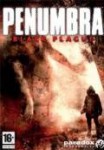 Penumbra: Black Plague (PC, 2008)
Penumbra: Black Plague (PC, 2008)
After Braid and Portal, it seemed we had entered an age when innovative, smaller budget titles would get their due — Penumbra: Black Plague hinted that we weren't quite there yet. Black Plague combined Bioshock's fear factor (this was the scariest game I have ever played — I literally couldn't sleep afterward, and needed to play it during daylight) with Portal's logic puzzles, and definitely deserved a greater following. With one of the most ingenious narrative-driven gameplay moments ever in its final act, Black Plague was a hard game to overlook when making a best of 2008 list (especially given the psychological scar it left on me).
Plays like: Portal, Silent Hill, System Shock 2.
Seekability: You must play this game! You must play this game! You must play this game and write about it on Bitmob!
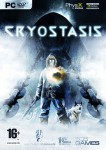 Cryostasis (PC, 2009)
Cryostasis (PC, 2009)
It’s telling that Cryostasis’ favorable reviews on Metacritic take the apologist’s stance. Cryostasis possessed an ambition and vision uncommon in the medium, which made it all the more difficult to point out the game’s many faults. I can’t ignore the problems you’ll run into in the game, but don't let them obscure all the good stuff. No doubt, Cryostasis was one of 2009’s most frustrating titles, but it was also one of the year’s most noteworthy.
Plays like: Condemned, Penumbra.
Seekability: If your PC can run it…but it probably can't. I still thought it was worth playing, even though I had the settings on low and it ran at 15 FPS.